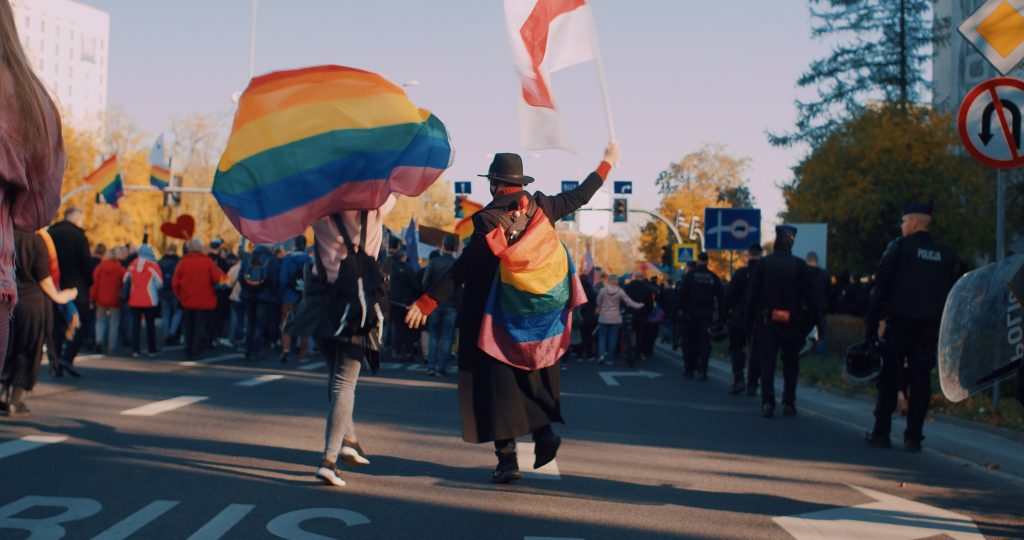
Photo by Michał Franczak via Unsplash
By Daniel Pepin
Being a part of the queer community has always meant a lot to me. I came out as bi in secondary school, partly because of a bizarre song my Year 8 History teacher played to mark Pride Month. I cannot remember the song’s name, but rest assured it was camp and quite awful. At college, I became aware of the messy beauty of the queer community – a Circuit Laundry machine filled with dirty clothes spinning so fast it shakes. Loud. Overwhelming. But an intimate comfort and a crucial addition to my life. A space that plucks people from dangerous and damaged lives, setting them down in a haven filled with the warmth of familiarity and expression. To be cliché, a family. A space steeped in monumental history stretching back millennia. Winterson, Marsha P. Johnson, Baldwin, Wilde, Donatello, Sappho, Harmodius and Aristogeiton.
Of course, in more recent history, a shadow hangs its evil head over that space. A pandemic that took root in the early eighties and remained for decades. AIDS decimated the queer community. It ruined lives with no refrain. Nearly 330,000 gay and bisexual men have died of stage three HIV (AIDS) since 1980 in the USA alone according to the Centre for Disease Control and Prevention. We can only read or listen to accounts of what queer life was like before the crisis, in books like Gay Bar: Why We Went Out by Jeremy Atherton Lin or podcasts such as The Logbooks. AIDS changed the queer community forever and should never be forgotten. As such an intrinsic part of Western queer history those devastating years deserve the same commemoration as the wars receive – perhaps more so. A war fought daily in city streets and hospital sheets with its soldiers drafted, not by choice, but from prejudice and hysteria. The fallen soldiers need to be celebrated, kept alive by the surviving few and their descendants.
However, imagine: a young queer man in the UK unknown to hardship from AIDS; facing minimal sexual discrimination in a world more tolerant than ever before; who has lost no one from complications around AIDS. A person who has only experienced the queer space as a happy space. As salvation. How odd it must seem to them to be reminded of a terrible plague that destroyed their community – now risen from ashes – by the people it destroyed. Should we not move on and celebrate new victories? The AIDS crisis more of a myth now, a dark chapter in our past – a horror story usurped for homophobic beliefs that queer people are unsafe disease-carriers. “Why should I care about that?” says my internal conflict. Does it not seem wrong that the thing which destroyed us also, often, defines us?
I admit that I have thoughts like these often. Any time I consume a piece of queer media (Hollinghurst, It’s a Sin…) that makes AIDS the focal point I feel a creeping sense of unease. Making a tragic episode of queer history into entertainment feels perverse. Even if those producing the entertainment are queer themselves. Even worse are the constant references to AIDS at queer events or showcases – every mention evinces a wincing response. Is this all we are allowed to be? Surely this community would try to distance themselves from being synonymised with disease. But the more we talk about it the more people could equate being gay to having AIDS. Sometimes it feels like free homophobic propaganda – self-immolation. But then comes the second guessing and the shame (a feeling the queer community is all too familiar with) of disrespecting my elders. Am I a bad queer? I should, without question, lap up every piece of queer media surrounding AIDS with a furrowed brow and earnest nod, and appreciate its efforts to destigmatise the illness. There is a paradox of an othered community seeking unity and solace in remembering the event that changed their landscape, due to deliberate and prejudiced mistreatment. I am well aware that I would feel immeasurably different if I were older and a veteran of the crisis, I understand the importance of remembrance – especially when nobody else will remember you. Yet, this persistent shadow – suffused in queer life – weighs on me, on my queer space now – turning the contemporary queer space from one of happiness to one of despair. This fixation on the terrible past seems counteractive – we should not view ourselves as damaged but as healing. We should commiserate not commemorate. Is it so wrong to want to forget something that never even happened to me?
